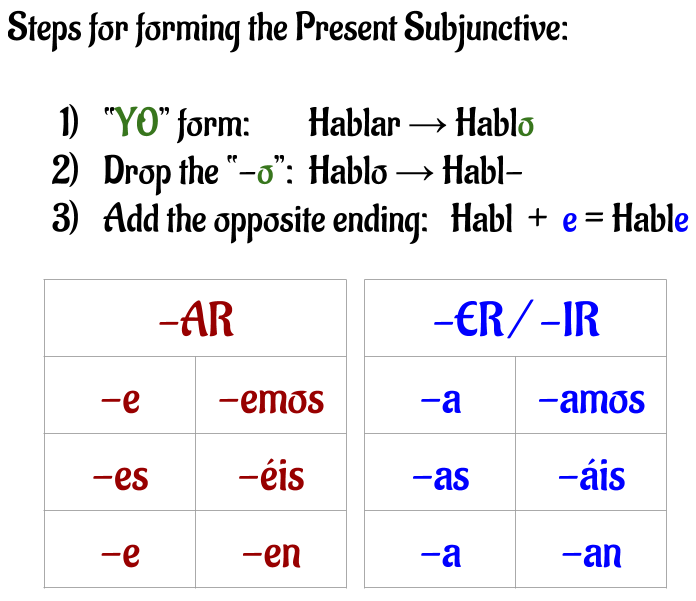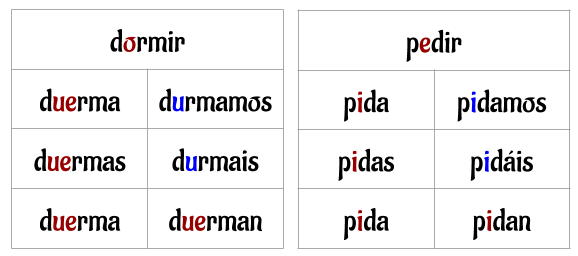El Subjuntivo
Indicative Mood
For the Subjunctive, it is important to understand what "Indicative" and what "Subjunctive" refers to grammatically.
The Indicative is a verb form which makes a statement or asks a question regardless of the time frame in which it happened. For example:
Javier come mucha pizza.
Javier eats a lot of pizza.
¿Dónde sacaste el libro?
Where did you get the book?
No vamos a verles mañana porque es sábado.
We are not going to see you all tomorrow because it is Saturday.
No nos iremos hasta llegar el piloto del avión.
We will not leave until the pilot of the plane arrives.
A Mood refers the form a verb takes to show how it is regarded (e.g., as a fact, a command, a wish, an uncertainty)
There are three major moods in Spanish & English:
The Indicative is a verb form which makes a statement or asks a question regardless of the time frame in which it happened. For example:
Javier come mucha pizza.
Javier eats a lot of pizza.
¿Dónde sacaste el libro?
Where did you get the book?
No vamos a verles mañana porque es sábado.
We are not going to see you all tomorrow because it is Saturday.
No nos iremos hasta llegar el piloto del avión.
We will not leave until the pilot of the plane arrives.
A Mood refers the form a verb takes to show how it is regarded (e.g., as a fact, a command, a wish, an uncertainty)
There are three major moods in Spanish & English:
- The Indicative Mood. This states facts or asks questions. For example: She is driving the car. Is she driving the car?
- The imperative Mood. This expresses a command or a request. For example: Drive the car.
- The Subjunctive Mood. This shows a wish or doubt. For example: I suggest that she drive the car. Not you.
Forming the Subjunctive...
Some verbs in the subjunctive do not follow the same rules as the other verbs, therefore are considered to be irregular. These verbs do not follow a specific pattern like the irregular YO verbs, but have to be memorized.
Here are further examples of verbs taking on the subjunctive form.
Most of your stem-changers will follow regular stem-changing rules, meaning they will change from an e-->i, e-->ie or o-->ue in the boot. There are a few that will follow a slightly different rule. They will stem-change the same as regular stem-changers, but will also have a stem-change in the nosotros and vosotros forms.
There are two qualifications to know if this is going to happen:
There are two qualifications to know if this is going to happen:
- The verb has to end with an -ir, and
- The verb will have the following stem-changes in the nosotros and vosotros forms:
Below is a website, Conjuguemos.com, where you can practice the conjugations.
Into the Subjunctive Mood...
Subjunctive forms, s the name suggests, occur in subordinate or dependent clauses. The subjunctive is an essential element in the expression of many ideas in Spanish. The learner has a three-part task in achieving a degree of proficiency in its use:
It has to be understood that for the Subjunctive Mood to take place, it has to follow the following basic rules.
Example:
Ellos esperan que mi hermano venga a la fiesta esta tarde.
They hope that my brother comes to the party this evening.
- Mastering the forms
- Recognizing ideas and constructions that require subjunctive, and
- Learning to respond automatically to those ideas and constructions.
It has to be understood that for the Subjunctive Mood to take place, it has to follow the following basic rules.
- There has to be TWO subjects and TWO verbs (one in the first clause and a second in the subordinate or dependent clause)
- "que" has to be present.
Example:
Ellos esperan que mi hermano venga a la fiesta esta tarde.
They hope that my brother comes to the party this evening.
Whether or not the subjunctive is going to be used in the second clause, is determined by the first clause and what it is communicating.
A decent way to remember is to remember the acronym D I V E. There are other acronyms, but this one I prefer over the others because it is simpler. IF the first clause expresses:
D = Doubt
I = Impersonal Expressions
V = Volition
E = Emotion
...then the second clause will use the subjunctive.
A decent way to remember is to remember the acronym D I V E. There are other acronyms, but this one I prefer over the others because it is simpler. IF the first clause expresses:
D = Doubt
I = Impersonal Expressions
V = Volition
E = Emotion
...then the second clause will use the subjunctive.
Reasons for Using the Subjunctive...
Expressions of DOUBT
When the first clause expresses doubt about another action, the subjunctive is required. Here are some example sentences, as well as some clauses that would trigger the subjunctive in the second clause.
IMPERSONAL Expressions
Impersonal expressions work a lot like emotions in that they express someone's opinion or value judgement. They focus on the subjectivity of the statement and not on the actual truth or reality of the situation. These are impersonal in nature and the first clause does not have someone pushing their agenda necessarily onto someone else.
Expressions of VOLITION
Volition refers to someone imposing their desires onto someone else. Here are some examples of these types of expressions.
Expressions of EMOTION
Verbs that express emotion require the use of the subjunctive in the second clause because an emotional response is subjective. This occurs even though the statement might be factual.
Adverbial Clauses (conjunctions)
The conjunctions listed below always call for the subjunctive because the actions are not yet realized, that is, not yet experienced or determined, at the time of reference.




